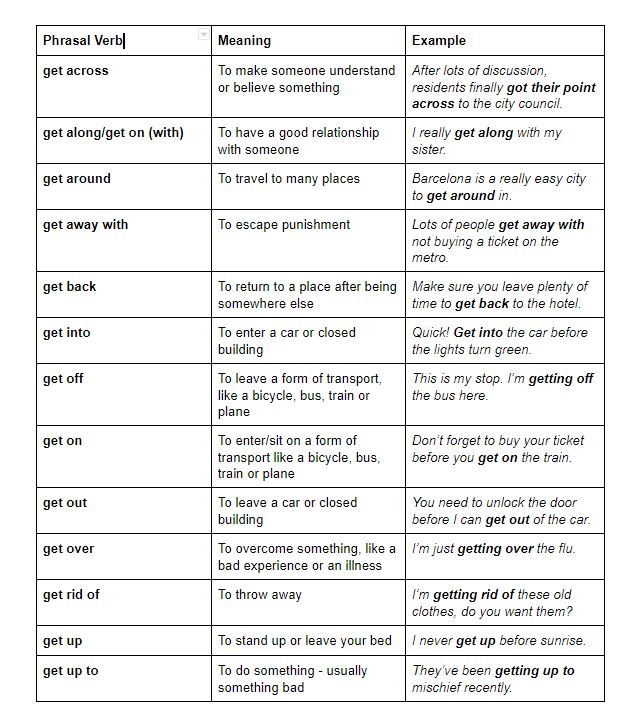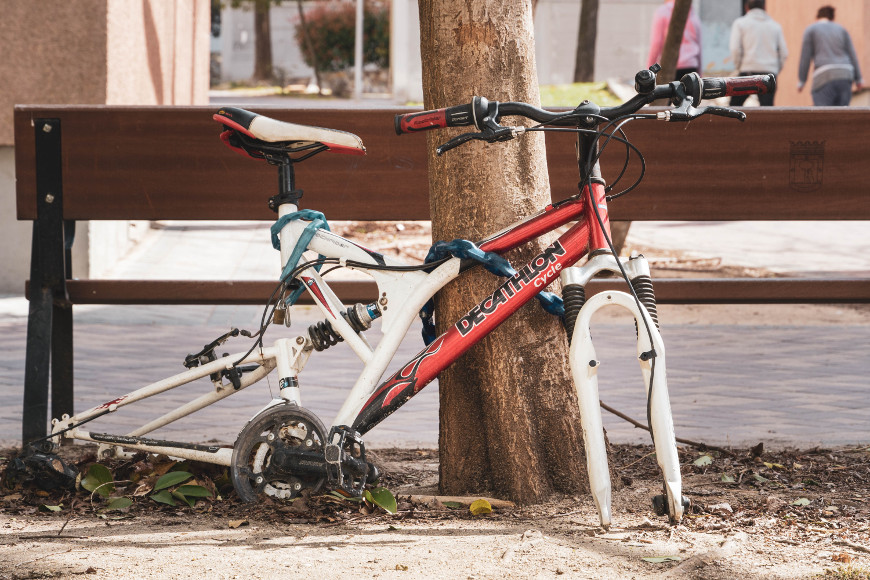Every language has one of those words that you hear all the time, but it’s used in so many different ways that it can be really confusing. In most cases, the translation of this word doesn’t make any sense, or you wouldn’t use this word the same way in your native tongue. In this video article we’re going to learn about one of the English language’s most commonly misused and often misunderstood words, GET.
GETTING TO KNOW GET
The word “get” always leaves people in doubt, and it can be very frustrating for the average English learner. The problem is that their are so many expressions and phrasal verbs that use the word “get” that it can be very confusing. Let’s take a look at some literal meanings.
Join the RealLife English community and GET connected with English learners from all around the world
6 Uses of the Word ‘Get’
The word “get” is so commonly used as a substitute for many words. A lot of the time when we use “get” it makes it less formal and it’s a lot more common in spoken English. Here are some examples of the 5 most common substitutions.
GET = BECOME (before adjectives)
When used before an adjective, the word get is a common substitution for the word become. This means that you are starting to become that adjective.
- If you don’t eat now you will get hungry later
- He got really angry when I told him I was leaving
- she is getting really skinny
GET = ARRIVE
The word arrive sounds formal when used in conversation. Arrive would be commonly used at airports/ travel arrangements or in a serious business setting. In normal situations we tend to use “get”.
- What time did you get there?
- I’ll ring him when we get to the park
GET=RECEIVE
This is a common mistake amongst Brazilians. Usually a Brazilian would use the word, “win” (Ganhar) in this case. In English “win” would only be used in regards to a prize or a competition/game.
- I got some cool presents for my birthday
- I got an email from my friend in Australia
- She always gets paid on Thursday
GET = OBTAIN/BUY
The word “buy” is used when you’re specifying the fact that you purchased something. If that’s not so important we substitute it for our good friend “get.”
- I got a new suit to wear to the conference.
- They got their instruments from the U.S.A.
GET = UNDERSTAND
This is simply an alternative way to say understand. You will here this more so in informal conversation but it doesn’t sound rude or inappropriate if it is used in a formal setting.
- Do you get what I’m saying?
- I don’t get it/ Got it!
GET = FETCH
In other words this meaning of “get” is when you leave where you are to collect (fetch) something and come back. A lot of people use the word take in this case which would be incorrect.
- Can you get me a glass of water?
- I’m going to get her from work.
- I’m going out to get some milk.
Expressions with GET
These are some of the most common, out of many. For more a more extensive list of expressions with “get”, check out this link http://www.wordreference.com/enpt/get To get along with- to have a good relationship with someone or a group of people.
- I get along really well with my co-workers
- He doesn’t get along with his in-laws
To get over something- to no longer feel bad, frustrated, or sad about something.
- I’m getting over the chicken pox
- He’s still getting over his bad break up with his girlfriend
To get rid of- to be relieved of something in you life by giving it to someone or throwing it away
- I’m trying to get rid of my old car but no one wants to buy it
- The boss got rid of all the unnecessary office equipment
To get to know someone- to be in the phase of learning about a person and becoming friends with them; to be starting to know all about a person, city, or even a product or service.
- I would really like to get to know your sister
- I’m getting to know the city really well
- I should start getting to know how to use this program
To get by- to be able to survive with the limited supply or knowledge of something that you have.
- I make just enough money to get by
- My Spanish isn’t so good but I can get by
So now that you know the uses of the word get, go out and put it to test. Try identifying the different uses of get while watching a movie, T.V. show or listening to some music or podcasts. Hopefully you will start to get how we use get little better, take advantage of all the online English resources and get excited about learning. That’s enough “gets” for one day, If you have any questions or feedback feel free to comment. Until we meet again Real Life English readers.
Like what you read?
For more articles that will revolutionize your English and to stay current with everything happening in RealLife English (community, events, resources) remember to sign up for our mailing list!
Get is a power word in the English language.
There are so many different meanings. This might be confusing for you as an English learner. But it’s important to learn how to use this word.
In this lesson, you’re going to learn 10 of the most common ways this word is used. And then, I’m also going to share some idioms with you.
The key to all of this is to learn the sentences. That way, you will internalize this word and how to use it. Learn more about to do that at the bottom of the post.
For now, watch the video and then take the lesson below.
10 Ways to Use the Word GET in English
Here are the ways in which we use get in English. Read the definitions and the examples. And then, see the collocations and idioms too.
Gain possession of / buy
Look behind me. Recently, I got some new things for my office. I got these *cough* fake plants, neon light, wall decorations… this means that I bought these things. Here are more examples:
- What did you get for your birthday?
- I’m thinking about getting a new car soon.
- I haven’t got my wife anything for Christmas yet – I’m starting to panic!
To become ill or have an illness
Yes, you can say catch a cold but it’s more common to say get a cold. Here are more examples:
- I’ve got a cold
- She keeps getting sick
- I’ve got a bit of a headache today.
Click here to learn more about sickness vocabulary. Or watch below:
To obtain and/or bring something to someone
This is something that is used a lot at home. For example:
- Could you get me a tea?
- Could you get me the remote?
- If you have time, get me some bananas on your way home (first conditional)
- Get some breakfast and then we’ll go
An alternative here is to bring up or down. For example, could you bring me up a cup of tea?
To hear or to understand
Listen to this: Time flies like an arrow, but fruit flies like a banana. You can respond to that by saying, “I’m sorry. I didn’t quite get that.”
- I don’t get what you mean. Could you explain that again?
- I didn’t quite get that – could you speak up?
To become (change)
This is really useful. Look at this example:
- It’s getting dark
It’s not dark now but it’s changing from light to dark. We use get to talk about a change.
- Your tea’s going getting cold. I’d drink it now*
- It’s getting hot out there
- Yawn. I’m getting tired.
*My wife and I talk about PDT: perfect drinking temperature. This is when the tea isn’t too hot and it’s too cold. It’s just right.
To learn more about how to talk about the weather, click here.
Movement
A good example of this is this one:
- What’s wrong with you? Why are you hobbling?
- I stubbed my toe getting into bed.
Here are more examples:
- Get down!
- Get your hands out of your pockets.
- I stubbed my toe getting into bed
- Let’s get outside – it’s beautiful out there
To leave public transport
After you get on a train you… get off it.
- Let’s get off here
- Where do we get off if we’re going to Big Ben?
- Get off at the next stop
This can be a little confusing. Because you get out of a car but get off a train. You get in the car but on a train.
This is why it’s important to learn English through sentences. And if you want to get audio sentences from this lesson – along with flashcards and many other resources – join TFP.
Arrive
Now speaking of traveling, when you arrive at your destination, you can use get here too.
- When is David going to get here?
- When mum gets here, turn off the TV, okay?
- Come on, let’s get going, we’ll get there really late otherwise.
- I hope my package gets here today.
To Receive or Be Given Something
- Let me know what you get in that quiz
- I got my hair cut yesterday – what do you think?
- I got my acceptance letter yesterday!
Collocations with Get
Collocations are simply two or more words that go together naturally. For example, you take a quick shower not a fast shower.
Now, some of the following can be explained through rules, but it’s important to learn them more naturally. To internalize them and to be able to use them instantly during natural conversation.
With that in mind, here are some of the more common collocations with get:
Get Married
This means to be joined in marriage. Notice the difference between to be married and to get married from the following examples:
- They got married last year
- They’re married
The first one talks about the act of getting married. The second focuses on the situation. Here are more examples:
- When are you going to get married?
- We’re getting married next year
That last example is in the present continuous. We use the present continuous to talk about future events.
Get Ready
There are two definitions here. Firstly, it can mean to put on clothes. For example, come on, get ready. We have to leave soon. Here are more examples:
- It takes her forever to get ready
- How long does it take you to get ready?
- I’m getting ready – almost done!
It can also mean prepare. Imagine that you’re throwing a party for the World Cup Final. You might say, we need to get the house ready for our party. Here are more examples:
- Can you get the presentation ready for tomorrow?
- Get ready… this is going to be a tough exam.
Get home/in
Before, you learned that we use get when we arrive somewhere. To get home is a good example of this:
- Come on, let’s get home
- What time did you get in last night?
- Is he getting home tonight?
Get some/any sleep/rest
Let’s get home and get some rest. This just means to sleep or to rest. We often use some/any in between get and sleep/rest. Here are more examples:
- I just need to get some sleep
- Do you think we’ll get any rest next week?
- I didn’t get any sleep last night
Get into trouble
Look at this example: He’s always getting into trouble! This means that he’s always misbehaving and either their parents, the police, or their teachers are punishing them.
Here are more examples:
- He got into a lot of trouble as a kid but he’s good now
- Try not to get into trouble tomorrow!
- What can we do to stop you from getting into trouble?
This can also mean to fall into difficulty.
- If you get into any trouble when traveling, call me straight away!
- We got into some financial trouble last year but we managed to get out of it.
Idioms with the Word Get
There are many idioms that include get. Let’s have a look at some of these now.
Get to the bottom of something
This means to discover the truth about something – often when the truth is hidden or hard to find.
It’s used in formal situations, mainly. For example, if things have gone missing at a school but no one knows why, the principal might say: we need to get to the bottom of this.
More examples are:
- The police are trying to get to the bottom of who committed that crime
- Let’s get to the bottom of this, ASAP
Get the hang of
This means to learn how to do something. For example, it didn’t take me long to get the hang of driving on the right side of the road. Or the wrong side…
- It might take you a little time to get the hang of how to use get but if you follow my methods you’ll definitely get there
- I just can’t get the hang of it
Get a kick out of something
To enjoy something – to find something amusing.
- Are you getting a kick out of me falling over?
- I still get a kick out of Blackpool losing
Over to You
There’s a lot to learn in this lesson. Knowing how to use GET can help. But the key to being able to use these sentences naturally, flexibly and fluently when speaking is to repeat the phrases until you memorize them.
That is where my program can help. You can get premium resources based on this lesson here. We’d love to have you!
Thank you for reading. Please share this lesson below!
The word ‘get’ is one of the most common and versatile verbs in English. It can be used in lots of different ways, and is usually seen in informal writing or speaking. You can use the word ‘get’ on its own, with a preposition to make a phrasal verb, or with a participle in the passive voice.
Now we’re going to look at some of these uses in more detail. So, let’s get started!
1. Get = to obtain, to receive, to buy
The word ‘get’ can be used as a verb to express the actions of obtaining, receiving or buying. To form a sentence, we use get + direct object or get + indirect object + object.
Let’s take a look at some examples. Don’t forget ‘get’ is an irregular verb, so when we use the past simple we change (or conjugate) to ‘got’
To obtain
- She got the telephone number from her boss.
- I got the grade to pass the course.
- Unfortunately, Henry didn’t get the job.
To receive
- Did you get my letter?
- He got a fine for driving too quickly.
- I got a delivery this morning.
To buy
- Can you get some milk from the shop?
- I didn’t get you a newspaper. I’m sorry.
- He’s just been shopping and got a new face cream.
2. Get = to reach, to arrive
We can use ‘get’ when talking about arriving or reaching a place, to express movement or travel. To form a sentence, we use get + place expression. After the word ‘get’, we also normally use the preposition ‘to’.
To reach
- How long did it take you to get to the top of the mountain?
- If you keep walking you’ll suddenly get to a bridge.
To arrive
- I usually get home at 7pm.
- What time do you get to school?
3. Get = to become
‘Get’ is also used to express a change of state or situation. To form a sentence, we use get + adjective.
To become
- Don’t get angry!
- Wear a jacket or you’ll get cold.
- The weather gets warmer starting in April.
- In the UK it gets dark at 5pm.
- After going for a run, I get really hungry.
4. Get as a phrasal verb
‘Get’ can be used in phrasal verbs, which have various meanings. To form a sentence, use get + preposition/adverb. Here are a handful of common examples:
5. Get in the passive
We can also use the word ‘get’ in the passive form. Here it is used in place of the verb ‘to be’ to sound more informal. So, instead of using the standard passive be + participle, we can also use get + participle. For example:
- My bike was stolen (standard passive)
- My bike got stolen (get passive)
We use the passive form when we want to emphasize the nature of the event, or the people involved instead of who does the action. For example:
- Mike just got promoted. (Emphasis on Mike rather than his boss)
- The burglar got arrested. (Emphasis on the burglar rather than the police)
‘Get’ is also very commonly used to describe negative events. For example:
- Our house got badly damaged in the storm.
- We got delayed coming back from London.
6. Get something done
Our final use of the word get is a more informal way of saying ‘to have something done’ for us or to us. This is normally when we pay for some kind of service – such as at the hairdresser, mechanic or dentist. To form a sentence, we use the structure get + object + past participle.
To get something done
- I’m getting my hair cut on Wednesday.
- I got my teeth checked at the dentist this morning.
- I need to get my laptop repaired.
- I’ll get your coat cleaned if you like.
- He gets his car washed every Saturday.
Enjoy this post? Check out our blog post: 10 phrasal verbs to help you become an English expert.
Glossary for Language Learners
Find the following words in the article and then write down any new ones you didn’t know.
Versatile (adj): able to be used for lots of different purposes.
Get started (exp): to begin.
Hairdresser (n): the place where you go for a haircut.
Key
adj = adjective
exp = adverb
n = noun
Study English at Oxford House Barcelona
Interested in taking an English course at Oxford House Barcelona? Check all the different English classes we can offer you now or in the summer, or contact us for more information.
Study English at Oxford House Barcelona
Interested in taking an English course at Oxford House Barcelona? Check all the different English classes we can offer you now or in the summer, or contact us for more information.

The verb get is very common in English. This verb can be used in so many different ways, including in some expressions. In this lesson, I will give you many examples of how to use it, like “to get going somewhere”, “to get well“, “to get over it”, and many more. So why not get started, get into it, and watch the video?

Quiz
Test your understanding of this English lesson
Test your understanding of the English lesson by answering these questions. You will get the answers and your score at the end of the quiz.
LEAVE A COMMENT
Get has a lot of meanings and uses, but I try to tell you as many ones as I remember:
1- Get: fetch, give > please get me some rice.
2- Get: Receive > I got a letter this morning.
3- Get: Achive, Gain > I got a lot of money
4- Get: understand > I didn’t get the point of the story.
5- Get: Arrive, reach> when did you get home? how did you get to the office?
6- Get: Have > I got a book. I got a lot to do.
7- Get: Buy > I got the car
8- Get: Become > don’t get yourself killed! I got busted
…
Phrasal verbs:
1- Get after : to follow
2- Get ahead : to make progress
3- Get on with: to be friendly with
4- Get back : return
5- Get on with : to have good relationship with
6- Get away : to leave
7- Get down : to let (sb) down, to make (sb) sad
8- get on/off a car
9- get out : to escape
10- Get over: to forget (about an ex-partner)
11- Get rid of : to have (sth) removed
12- Get up: to get out of bed
…
there are so many other meanings, you can find them in your dictionary






